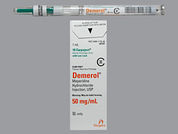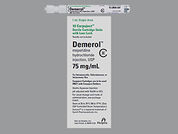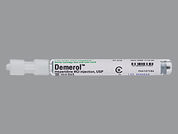Demerol
Meperidine Hcl/Pf
What is Demerol used for?
Meperidine is used to help relieve moderate to severe pain. It may also be used before and during surgery or other procedures. Meperidine belongs to a class of drugs known as opioid analgesics and is similar to morphine. It works in the brain to change how your body feels and responds to pain. Meperidine should not be used to treat long-term or ongoing pain. It should only be used to treat sudden episodes of moderate to severe pain. See also Precautions section. This drug is not recommended for use in newborns due to an increased risk of serious side effects. Ask the doctor or pharmacist for details.
CHEMICAL NAME
DRUG TYPE
Pain/InflammationDemerol Prices
Searching for the lowest prices
What does Demerol look like?
View all Demerol Image Information (5)Demerol Frequently Asked Questions
See also Warning section.
Drug interactions may change how your medications work or increase your risk for serious side effects. This document does not contain all possible drug interactions. Keep a list of all the products you use (including prescription/nonprescription drugs and herbal products) and share it with your doctor and pharmacist. Do not start, stop, or change the dosage of any medicines without your doctor's approval.
Some products that may interact with this drug include: certain pain medications (mixed opioid agonist-antagonists such as butorphanol, nalbuphine, pentazocine), naltrexone, samidorphan.
Taking MAO inhibitors with this medication may cause a serious (possibly fatal) drug interaction. Avoid taking MAO inhibitors (isocarboxazid, linezolid, metaxalone, methylene blue, moclobemide, phenelzine, procarbazine, rasagiline, safinamide, selegiline, tranylcypromine) during treatment with this medication. Most MAO inhibitors should also not be taken for two weeks before treatment with this medication. Ask your doctor when to start or stop taking this medication.
The risk of serious side effects (such as slow/shallow breathing, severe drowsiness/dizziness) may be increased if this medication is used with other products that may also cause drowsiness or breathing problems. Tell your doctor or pharmacist if you are taking other products such as other opioid pain or cough relievers (such as codeine, hydrocodone), alcohol, marijuana (cannabis), drugs for sleep or anxiety (such as alprazolam, lorazepam, zolpidem), muscle relaxants (such as carisoprodol, cyclobenzaprine), or antihistamines (such as cetirizine, diphenhydramine).
Check the labels on all your medicines (such as allergy or cough-and-cold products) because they may contain ingredients that cause drowsiness. Ask your pharmacist about using those products safely.
The risk of serotonin syndrome/toxicity increases if you are also taking other drugs that increase serotonin. Examples include street drugs such as MDMA/"ecstasy," St. John's wort, certain antidepressants (including SSRIs such as fluoxetine/paroxetine, SNRIs such as duloxetine/venlafaxine), among others. The risk of serotonin syndrome/toxicity may be more likely when you start or increase the dose of these drugs.
Other medications can affect the removal of meperidine from your body, which may affect how meperidine works. Examples include azole antifungals (such as ketoconazole), macrolide antibiotics (such as erythromycin), mifepristone, rifamycins (such as rifabutin), ritonavir, drugs used to treat seizures (such as carbamazepine, phenytoin), among others.
This medication may interfere with certain lab tests (such as amylase/lipase tests), possibly causing false test results. Make sure lab personnel and all your doctors know you use this drug.
IMPORTANT: HOW TO USE THIS INFORMATION: This is a summary and does NOT have all possible information about this product. This information does not assure that this product is safe, effective, or appropriate for you. This information is not individual medical advice and does not substitute for the advice of your health care professional. Always ask your health care professional for complete information about this product and your specific health needs.



